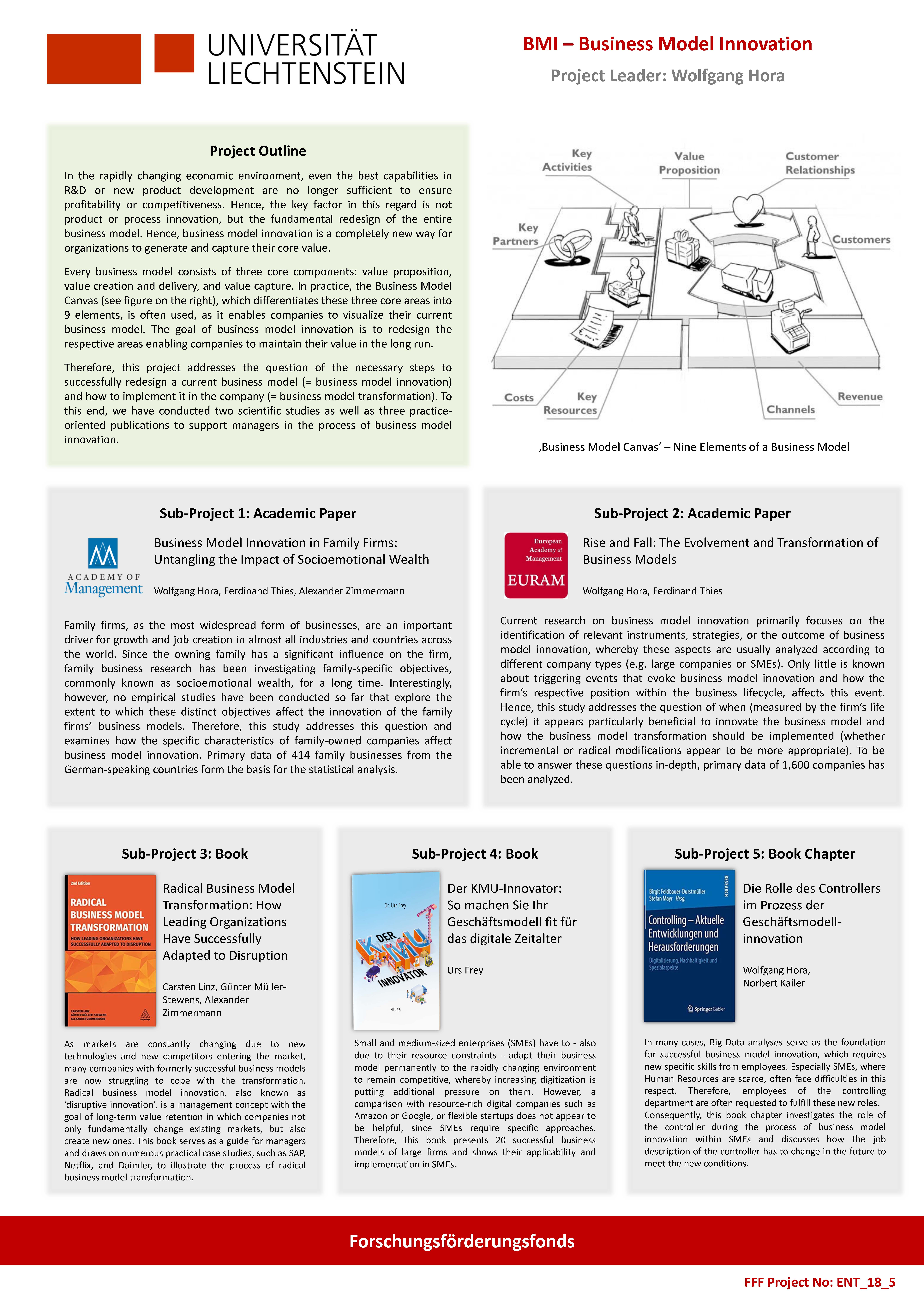Projektart und Laufzeit
FFF-Förderprojekt, Juli 2018 bis August 2020 (abgeschlossen)Koordinator
Lehrstuhl für Entrepreneurship und Strategisches ManagementForschungsschwerpunkt
Wachstum und KomplexitätForschungsgebiet/e
UnternehmungBeschreibung
In the rapidly changing economic environment, even the best capabilities in R&D or new product development are no longer sufficient to ensure profitability or competitiveness. Hence, the key factor in this regard is not product or process innovation, but the fundamental redesign of the entire businessmodel. Every firm has a business model, which is divided into the three core components valueproposition, value creation and delivery, and value capture, and further sub-areas. The objective ofbusiness model innovation is now to redesign the respective areas in a way that enables companies tomaintain their value in the long run.Therefore, this project addresses the question of the necessary steps to successfully redesign a currentbusiness model (= business model innovation) and how to implement it in the company (= businessmodel transformation). To this end, we have conducted two scientific studies as well as three practice -oriented publications to support managers in the process of business model innovat ion.
Since each of these five publications follows different targets and therefore provides different findings, a short outline of the individual subprojects is given.
In the first subproject, "Business Model Innovation in Family Firms: Untangling the Imp act of Socioemotional Wealth", we tackled the question of how the specific characteristics of family firms (e.g., control of the company by the family, social ties between the family and the firm, or succession planning) affect the process of business model innovation. By analyzing primary data from 414 family businesses, we were able to determine that the specific characteristics of family businesses have both positive and negative effects on business model innovation. Our findings contribute to the current research field "Innovation in Family Firms" on the one hand but also support managers in the process of business model innovation on the other hand.
The second subproject "Rise and Fall: The Evolvement and Transformation of Business Models" analyzes the question of when it seems to be the best time to innovate the business model and how this process should be achieved then. To this end, we have analyzed primary data of 1,600 companies and, based on the life cycle of the firm, we have determined at which stages it appears more appropriate to make either incremental or radical changes to the existing business model. This study has provided empirical evidence that firms make radical changes to their business models particularly in the growth and revival phase, and that there is hardly any adaptation in the maturity phase - these findings are argued by the fact that companies strive more for exploitation and focus less on exploration at the latter stage.
Subprojects 3-5 each focused on practice-oriented publications. For example, the book "Radical Business Model Transformation: How Leading Organizations Have Successfully Adapted to Disruption" provides a useful guide for managers in large firms. To this end, numerous case studies of wel l-known companies such as SAP, Netflix, or Daimler have been compiled to demonstrate how these companies have solved the challenge of business model innovation. The other two subprojects "Der KMU-Innovator: So Machen Sie Ihr Geschäftsmodell fit für das digitale Zeitalter" and "Die Rolle des Controllers im Prozess der Geschäftsmodell-innovation" each address the issue of business model innovation in SMEs. To this end, the authors discussed specific strategies for a successful business model innovation by concentrating on the specific needs of SMEs.
Projektergebnisse:

Schlagworte
Geschäftsmodellinnovation, Digitalisierung
Projektleiter
Professor
Publikationen
Hora, W., & Kailer, N. (2019). Die Rolle des Controllers im Prozess der Geschäftsmodellinnovation. In B. Feldbauer-Durstmüller & S. Mayr (Eds.), Controlling - Aktuelle Entwicklungen und Herausforderungen (pp. 455-469). Wiesbaden: Springer/Gabler.
details
Hora, W., Thies, F., & Zimmermann, A. (2020). Business Model Innovation in Family Firms: Untangling the Impact of Socioemotional Wealth. Presented at the Academy of Management Annual Meeting, Virtual.
detailsHora, W., & Thies, F. (2020). Setting the Stage for Business Model Innovation in Family Firms. Presented at the European Academy of Management Conference (EURAM), Virtual.
detailsHora, W., & Thies, F. (2019). Rise and Fall: The Evolvement and Transformation of Business Models. Presented at the European Academy of Management Conference (EURAM), Lisboa, Portugal.
details
Zimmermann, A. (2019, October 2-5). Radical business model transformation in Singapore. Euro-Asia Management Studies Association (EAMSA), FH Vorarlberg.
details